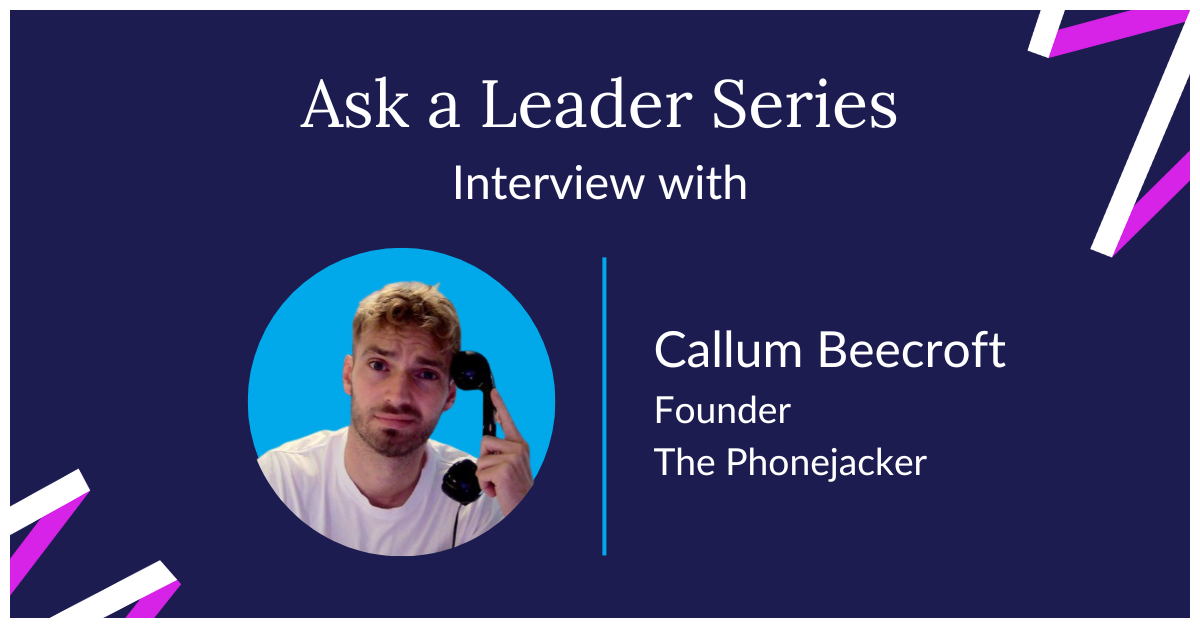Interview with Callum Beecroft, Founder at The Phonejacker
In this interview, Callum Beecroft, founder of The Phonejacker, talks about the biggest mistake he's made in his career, the most common sales objection he gets and how to overcome them, tips for leaving voicemails, and his take on swearing during meetings.
1. What’s the most common objection you get and how do you overcome it?
Traditionally, a lot of salespeople will talk about their product features, advantages and benefits, clients that they've helped, and all of this lovely stuff. But prospects don't care about that.
Prospects care about what problems they have in their world, and whether you can fix them or help alleviate some pain or whatever. So I always talk about problems.
And I know a lot of salespeople don't do that on cold calls. So the number one objection I get on these cold calls is that they don't have any of these problems. And it could be an objection, or it could be a statement of fact. They could just not actually have any of those problems in their world.
But it's the one that I have to deal with the most–trying to figure out whether they're telling the truth, or whether they're hiding something, and I need to dig a little bit deeper to try and find a problem.
2. What tip can you share about leaving voicemails?
The number one tip that I would share is to not let on that it's a sales call.
A lot of people I see leave a voicemail, and they'll just give some sort of pitch. If they were to connect with the person and have a conversation, they'd probably get the same sort of pitch that they would deliver if the person picked up. And then they tell them, who they are, what company they work for, what they do, how great they are, and how they might be able to help this individual.
And the problem with that is when prospects hear that, they know it's a sales call, it's highly likely that they've got some service or product in place already. So it doesn't really distinguish from how they might be able to help them or their competition.
So what prospect is going to call that person back? Very, very few.
So what I would do is don't mention it's a sales call, and try and leave some curiosity for the prospect. So I use a voicemail cut-off, whereby I basically say, 'Hey, this is Callum, the reason for the call is I was speaking to a colleague of mine the other day,' –and then I'll hang up at that point; I hang up mid-sentence.
So the prospect hears it and they're like 'Who's this Callum who's speaking to a colleague the other day? What's the rest of the message?'
Because all I want to do is get people to call me back. I don't really care about why they're calling me back, or why they think they're calling me back. I just want to get them on the phone.
And the great thing with that is I reckon around 20-30 % of people will call back. But also, when they call you back, they've called you, so it's a lot harder for them to hang up when it's their call. So yeah, that'd be my advice. Don't let on that it's a sales call, because who's gonna call you back? Just do that the voicemail cut-off–it works.
3. Yay or nay on swearing during sales meetings?
The short answer would be yeah, no problem with it. But it depends on how it's used.
I think if you're using profanity to demonstrate some sort of empathy, for example, then it kind of exaggerates the level of empathy. Rather than saying, 'Oh, that sounds frustrating,' say, 'That sounds f***ing frustrating!'
It's a lot deeper in terms of the empathy being shown. So I think it's good. I think it can help kind of alleviate any tension–if there is any. And it just shows that you as a salesperson are human, which is a big problem for a lot of prospects, right?
They meet these salespeople where they're kind of put into some form of process or they're asked really bad questions. And yeah, it can feel like an "un-human" experience. It's a small factor of it. But yeah, for sure, it can help if it makes sense.
Obviously, I wouldn't recommend swearing at the prospect in any form of negative way. I can't see that going down too well. But 'yes' would be the short answer to that for sure. I would definitely swear.
4. What’s the biggest mistake you’ve made in your career?
Certainly the biggest mistake I made was believing that I was good, when in actual fact, I wasn't. I think a lot of salespeople fall into that trap.
Whenever they book a meeting or whenever they sell a deal, sign a contract, or whatever, a lot of salespeople believe it's because of their winning personality, their charm, and all these things.
But more often than not, all of that is irrelevant. Probably the reason that that person booked a meeting or signed a deal or made a purchase was because they needed whatever that product or service was.
So it's understanding that as salespeople, we're "insignificant." And it's not about us, it's about the prospect. And if you want to be successful at sales, you've got to get out of your own way and try and help the prospect see that whatever product or service you have, whatever problems that product or service fixes, the prospect might be better off purchasing this. That's literally what sales and prospecting is.
Check out this interview with Chet Lovegren, head of global sales dev. at Jellysmack.





